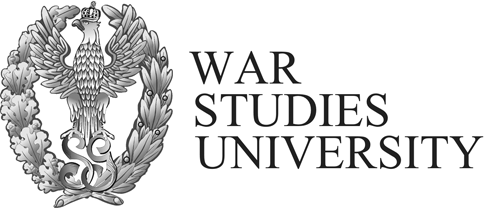Online first
Current issue
All issues
About
Aims and scope
Peer review process
Publication policy and ethics & malpractice statement
Editorial Board
Reviewers
Publisher
Guide for authors
Call for papers
Book Reviews
Special Issues Archive
New and emerging technologies in defence education, training and governance
RESEARCH PAPER
The role of Unmanned Aerial Vehicles in the formation of a secure military supply chain
1
War Studies University, Warsaw, Poland
Online publication date: 2016-09-23
Publication date: 2016-09-30
Security and Defence Quarterly 2016;12(3):19-45
KEYWORDS
ABSTRACT
The research problem described in the paper originates from the lack of adequate force protection
of tactical level logistic units supporting forces in battle. The author tries to prove the necessity
of the application of unmanned aerial vehicles (UAV) in order to ensure security of tactical
level supply chains. The new technologies may be an innovative and perspective solution for the
problem of the absence of force protection structures in logistic units. The author considers the
use of UAVs for observation, reconnaissance and active force protection of logistic points and
logistic units supporting tactical level forces. The problem is to choose the correct UAV type and
to organise the unmanned autonomous systems (UAS) defined as electromechanical systems
with no human operator on board, capable of performing operations in airspace.
REFERENCES (8)
1.
Autonomy Levels for Unmanned Systems (ALFUS) Framework Volume I: Terminology Version 1.1 by the Federal Agencies Ad Hoc Autonomy Levels for Unmanned Systems Working Group Participants, Edited by: Hui-Min Huang National Institute of Standards and Technology, September 2004, s. 20.
2.
B. Sajduk, Problem walki na odległość w perspektywie historycznej, społecznej i etycznej, [w:] Systemy dronów bojowych. Analiza problemów i odpowiedzi społeczeństwa obywatelskiego, (red.) K. Kowalczewska, J. Kowalewski, Scholar, Warszawa 2015.
3.
L. Cwojdziński, Klasyfikacja oraz zasady eksploatacji bezzałogowych platform latających, motoszybowce.pl, (10.02.2017 r.), s. 30.
5.
Klasyfikacje i wymagania dla bezzałogowych statków powietrznych UAV w Polsce, Redakcja Militarium, http://militarium.net/klasyfik...- statkow-powietrznych-uav-w-polsce/, (05.02.2017 r.).
6.
STANAG 4586(NATO Standardization Agreement 4586) is a NATO Standard Interface of the Unmanned Control System (UCS) Unmanned Aerial Vehicle (UAV) interoperability. It defines architectures, interfaces, communication protocols, data elements and message formats. It includes data link, command and control, and human/computer interfaces.
7.
Poradnik logistyczny do ćwiczeń i treningów sztabowych (Związek taktyczny, oddział, pododdział), praca zbiorowa pod red. M. Kaźmierczak, ASzWoj, Warszawa 2016, p. 109.
CITATIONS (1):
1.
Computer-aided simulation of unmanned aerial vehicle composite structure dynamics
Artur Kierzkowski, Tomasz Kisiel, Maciej Milewski, Ádám Török, Michał Stosiak, Jakub Wróbel
Transport
Artur Kierzkowski, Tomasz Kisiel, Maciej Milewski, Ádám Török, Michał Stosiak, Jakub Wróbel
Transport
Share
RELATED ARTICLE
We process personal data collected when visiting the website. The function of obtaining information about users and their behavior is carried out by voluntarily entered information in forms and saving cookies in end devices. Data, including cookies, are used to provide services, improve the user experience and to analyze the traffic in accordance with the Privacy policy. Data are also collected and processed by Google Analytics tool (more).
You can change cookies settings in your browser. Restricted use of cookies in the browser configuration may affect some functionalities of the website.
You can change cookies settings in your browser. Restricted use of cookies in the browser configuration may affect some functionalities of the website.




